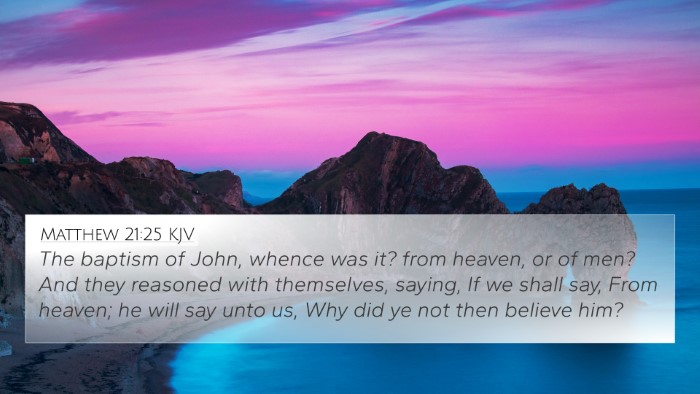Bible Verse Meaning of Mark 11:31
This verse reads: "And they reasoned with themselves, saying, If we shall say, From heaven; he will say, Why then did ye not believe him?" (Mark 11:31, KJV).
Summary of Mark 11:31
In this passage, we find the religious leaders engaged in a moment of internal deliberation. They are questioning the authority of Jesus after he cleansed the temple and challenged their institutions. Their reasoning reflects a struggle between acknowledging Jesus' divine authority and preserving their own power and traditions.
Interpretation from Public Domain Commentaries
Insights from Matthew Henry
Matthew Henry notes that the Pharisees and chief priests, faced with Jesus' authority, attempt to interpret it based on their understanding of religion. They acknowledge that admitting Jesus' divine authority would compel them to change their stance and accept his teachings, which they are unwilling to do.
Insights from Albert Barnes
Albert Barnes emphasizes the irony in their reasoning. The leaders feared the reaction of the people if they acknowledged Jesus’ authority, reflecting their concerns about public opinion over sincere belief. Their decision-making process reveals the depths of their unbelief and the political inertia within their ranks.
Insights from Adam Clarke
According to Adam Clarke, the dialogue highlights how humans often engage in rationalization to avoid uncomfortable truths. Here, the priests recognize that rejecting John's authority would lead to a greater backlash from the people who had accepted him as a prophet.
Thematic Bible Verse Connections
This verse can be linked to a variety of biblical themes and other scriptures, deepening our understanding through cross-referencing:
- Matthew 21:25: "The baptism of John, whence was it? From heaven, or of men?" - A parallel questioning of authority.
- Luke 20:5: Similar reasoning among leaders regarding Jesus' authority and John the Baptist.
- John 5:44: Discussion of seeking glory from one another instead of from God.
- Acts 5:39: "If it be of God, ye cannot overthrow it." - A reminder of the power of divine authority.
- Romans 1:21: Addressing the concept of people suppressing the truth.
- 1 Corinthians 2:14: The spiritual person discerned spiritually when evaluating truth.
- Hebrews 3:12-13: A warning against an evil heart of unbelief.
- James 1:6: The importance of faith without doubt, similar to recognizing God's authority.
- John 12:42-43: Many believed in Jesus but were afraid to publicly acknowledge him.
- Matthew 16:3: Jesus' critique of their inability to discern the signs of the times.
Cross-Referencing Insights
Understanding Mark 11:31 requires discerning connections between various Bible verses. Here are some methods for cross-referencing:
- Tools for Bible Cross-Referencing: Utilize a Bible concordance to uncover relationships.
- Bible Cross-Reference Guide: Guides assist in thematic studies of verses and their relationships.
- Cross-Referencing Bible Study: Engage with texts side-by-side for comparative analysis.
- Inter-Biblical Dialogue: Analyze conversations between Old and New Testament scriptures.
- Identifying Connections: Seek parallels in gospel accounts that discuss Jesus' authority.
Conclusion
Mark 11:31 reminds believers of the ongoing struggle between divine authority and human tradition. By engaging with the text in depth, through comparison and thematic connections, we can deepen our understanding of scripture and enhance our faith.
Further Study Recommendations
For those seeking a more profound understanding of this passage, consider:
- Exploring cross-referenced themes in the Bible to uncover deeper meanings.
- Engaging in a comparative study of the Gospels to grasp differing perspectives on Jesus' mission.
- Investigating Old Testament prophets’ messages to see parallels with John the Baptist and Jesus.










